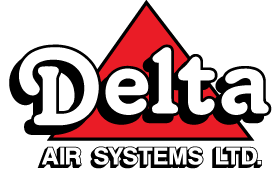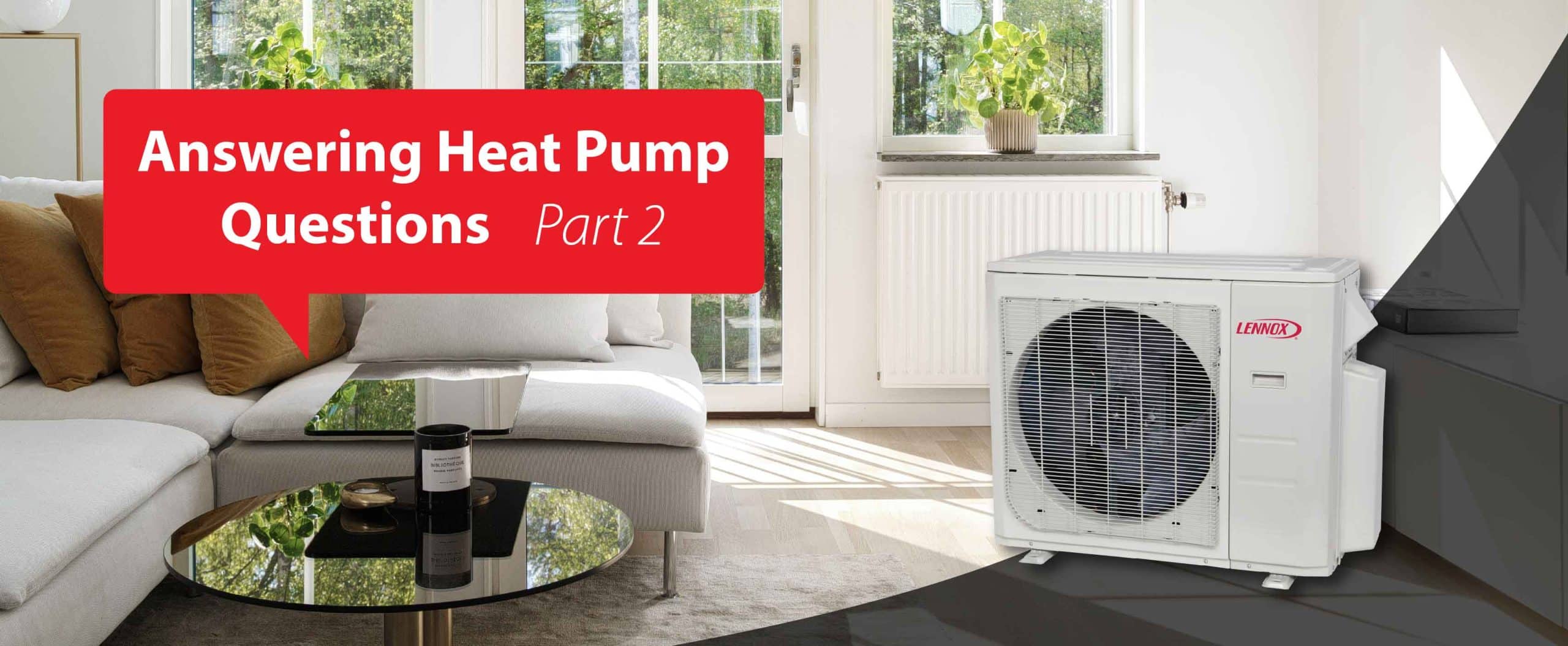As promised, here’s the follow-up to our article Your Heat Pump Questions Answered. We’ve got 10 more questions and 10 more heat pump answers about for you. If you don’t see yours answered here, send us a message or give us a call and we’d be happy to answer it for you!
1. What’s the difference between a heat pump and an air conditioner?
The main difference between a heat pump and an air conditioner is that an air conditioner cannot heat your home like a heat pump can. Whereas a heat pump acts as both a heating and cooling system, an air conditioner is only able to cool your home.
2. How does a heat pump defrost itself in the winter?
When temperatures drop below freezing, the outdoor coil of a heat pump can become covered in frost or ice. This can lower the efficiency of the heat pump and eventually cause it to stop working. To prevent this, heat pumps have a defrost cycle that allows them to remove the ice buildup from the outdoor coil.
The defrost cycle typically begins when the outdoor coil temperature falls below a certain threshold. The heat pump switches from heating mode to defrost mode. The heat pump uses sensors to determine when the defrost cycle is complete, which usually only takes a few minutes. Once the outdoor coil is defrosted, the heat pump switches back to heating mode.
3. How loud is a heat pump?
Heat pumps are designed to run quietly, though the level of noise depends a bit on the model, location, and installation. Most models make noise comparable to a fridge, with the outdoor unit being a little louder. In general, though, modern heat pumps are designed with advanced technology and materials to minimize noise.
4. Can a heat pump cool my home as well as heat it?
Yes! Heat pumps are 2-in-1 machines that can both heat and cool your home. In heating mode, a heat pump absorbs heat from the outdoor air, ground, or water source, then compresses and transfers the heat to an indoor coil. The heated air then circulates inside the home. In cooling mode, the process is reversed.
When you have a heat pump, you have both a heating system and an air conditioner in one system.
5. Do I need a backup heating system with a heat pump?
Not necessarily. However, there are benefits of having a backup heat source. While heat pumps are designed to provide reliable heating in most climates, it may be advisable to have a backup heating system, particularly in areas with extreme winter weather or frequent power outages.
Another reason to have a backup source is efficiency. A hybrid system combines the efficiency of a heat pump and the power of a forced air system, like a furnace, for times when it’s extremely cold. Since heat pumps work most efficiently in more moderate climates, a furnace could be more efficient in extreme cold.
6. Can a heat pump work with a gas furnace as a backup heating system?
Yes. This would be what we referred to in the previous question as a hybrid heating system. It’s also called a dual-fuel system.
This type of system has advantages. By utilizing the heat pump’s efficiency during milder weather, homeowners could save on energy costs and reduce their carbon footprint. Meanwhile, the gas furnace provides reliable heating during colder weather, ensuring that the home stays warm during extreme temperatures.
7. How much space do I need around my heat pump for proper operation?
Heat pumps are compact HVAC systems that don’t require a ton of space. Still, the amount of space required depends on the model and manufacturer recommendations, as well as local building codes.
In general, a heat pump needs enough space for proper airflow and to allow access for maintenance. Most manufacturers recommend a minimum clearance of at least 2-3 feet around the sides and back of the heat pump and at least 4-6 feet of clearance above the unit.
8. Can a heat pump be installed in any home?
Generally speaking, yes, heat pumps can be installed in any home. They don’t require a lot of space and they come in ductless models for homes that don’t have ductwork.
Be sure to think about the following before installing one in your home:
- Climate – Do you require a cold climate heat pump or a hybrid system?
- Ductwork – A ductless mini-split might be best if you don’t have ductwork.
- Electrical Capacity – Your electrical system must be adequate to power the heat pump.
- Building Codes – Check that there’s no regulation against installing heat pumps.
9. How do I know if a heat pump is right for my climate?
A heat pump can work in any climate. However, as mentioned, it might be advisable to have a dual-fuel heating system if you live in an area prone to extreme cold. You can speak to one of Delta’s technicians about whether you should install a hybrid system.
10. Can a heat pump improve indoor air quality?
Yes, heats pump can improve indoor air quality. First of all, there’s no combustion like there is with a gas-powered furnace. This means less carbon emissions and cleaner air. Plus, heat pumps are equipped with filters that trap dust and other contaminants. Some models have advanced filtration systems that remove even smaller particles from the air in your home.
Heat Pumps & Heat Pump Grants
Heat pumps are efficient and versatile machines that can reduce your carbon footprint. Delta carries all kinds of heat pumps and specializes in their installation. And, with our help, you can access available rebates and grants that can save you thousands of dollars on the installation of your heat pump.
For answers to your heat pump questions, contact Delta.
Delta Air Systems is an established heating company in the Kitchener-Waterloo region. And we’ve been installing, servicing and repairing heating and cooling systems since the 1950s and work hard to ensure complete customer satisfaction.
Follow us on Facebook and Instagram for more tips and to see our current promotions.





